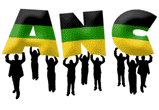The Left’s challenge is the new poor

The ever-rising poverty, joblessness and homelessness in South Africa may actually weaken the Left – the Congress of South African Trade Unions (COSATU) and the South African Communist Party (SACP) – within the African National Congress (ANC) family, rather than strengthen their influence, writes William Gumede in this week’s Pambazuka News.
The conventional wisdom among Congress of South African Trade Unions (COSATU) and (South African Communist Party) SACP strategists, and many other commentators, in business, civil society and opposition parties, is that exploding poverty should naturally strengthen the power of the Left within the African National Congress (ANC) tripartite alliance. Yet the reverse may actually hold true.
In fact, despite the central role COSATU and the SACP played in the ‘Zunami’ that swept Jacob Zuma into the Union Building and Luthuli House, both these organisations of the Left are in real danger of losing so much influence that by the end of the Zuma presidency they may end up only as a lobby group within the ANC.
Rising poverty may actually strengthen populist, and tribalist and narrow nationalist politics in South Africa, rather than Left or progressive politics.
One of the costs of severe mass poverty is mass alienation, mass family breakdown, mass breakdown in individual self-esteem, especially in our country, where self-worth is now increasingly measured in how much money one has. Mass poverty may also cause mass rejection of democracy as solution to problems. In the South African context, in moments of crisis, people often seek solace in tradition, tribe, identity and patriarchy, to affirm, gain dignity or self-respect. These frequently are translated into over-assertions of African or blackness, or ethnicity expressed in over-emphasis on Zulu-ness or Xhosa-ness as the main source of identity. This can be manifested against those seen as the ‘haves’, whether whites, business people, foreigners, or the new black middle class. Socially, these are deeply conservative sentiments. Yet, at the same time, those alienated because of poverty may readily support radical changes normally associated with ‘Left’ positions.
The reality is that rising poverty in South Africa is changing society and its politics also, opening up a gaping hole at the centre of South Africa’s politics. Many of the current political parties, social movements and democratic institutions, are not attuned to these changes, even if they profess in rhetoric to be so. The spontaneous community protests against lack of government service delivery, corrupt and indifferent public officials, are a case in point. It caught many organised civil groups and parties by surprise. The South African National Civic Organisation (SANCO), supposedly an organisation fighting on behalf of local communities was spectacularly absent. In fact, rapid changes in society, associated with increased poverty, and alienation – and the SANCO leadership’s inability to respond to this – are partially to blame for the organisation being on the verge of extinction.
Some populist leaders in the ANC with a more developed political antenna have already exploited these changes in society, caused by mass poverty. They have made their platform adopting supposedly left positions such as ‘nationalisation’, when it comes to economics; but combining it with social conservatism, approving of polygamy and virginity testing; and adopting muscular policies to deal with social problems, such as the ‘shoot-to-kill’ and ask questions later policy to bring down crime. The typical populist program is combining militant economics, social conservatism and muscular policies to deal with social ills, with regularly attacking ‘elites’, whether white or black or business, and when doing so, using the language, slogans and songs to legitimise it.
For COSATU leaders the dangers should be obvious. Increasing poverty and job losses will reduce the membership base, coherence and strength of COSATU. Most of those who lose jobs are typical trade union members. The poor – jobless, homeless, rural peasants and young, are now in electoral terms the overwhelming majority. With a smaller base, the trade union federation will face the danger of becoming a ‘labour aristocracy’, of organising only a small working class base who has jobs.
The SACP is organised as an elite movement, with a relatively small membership, typically trade unionists, students and those working in civil society. As more and more South Africans become poorer, the membership of the SACP, many also become unrepresentative of the majority mass poor.
Unless the SACP and COSATU dramatically refocus, modernise and change strategic direction, their influence may decline, rather than increase. To adapt to the changes, COSATU may have to start operating more as a social movement. It must now focus specifically on organising the unemployed, rural poor and youth. It will also have to play a bigger role in agitating for housing, public transport and dealing with crime, and consumer rights, for example. This will be new territory, which may demand different kind of organising skills.
At the same time the SACP will have to turn itself into a mass party, with mass community, youth and rural branches. A mass-based SACP, and a social movement COSATU, will not only have to provide answers on economic and political issues, but also progressive answers to the difficult questions of individual alienation, family breakdown, establishing a more caring male identity, how to achieve genuine gender equality, and how to find a balance between tradition and democratic values. Unless COSATU and the SACP make the crucial adjustments now, they will cede influence to the populists and narrow nationalists in the future.
BROUGHT TO YOU BY PAMBAZUKA NEWS
* This article first appeared in the Sowetan.
* William Gumede is co-editor (with Leslie Dikeni) of the recently released Poverty of Ideas.
* Please send comments to [email protected] or comment online at Pambazuka News
